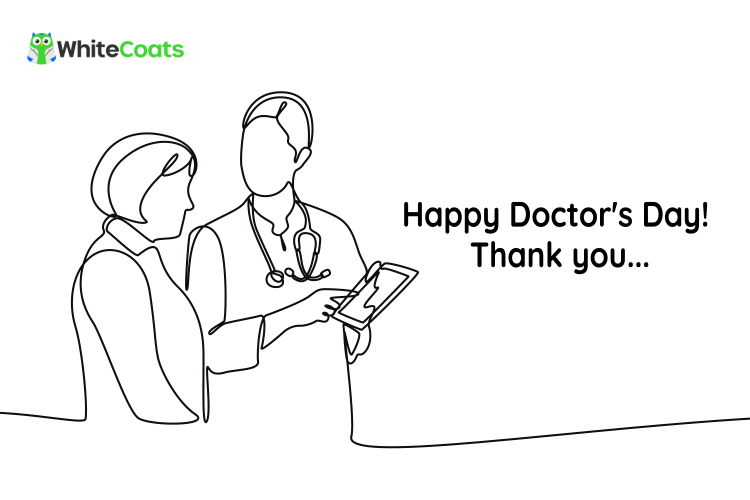
Celebrating National Doctors’ Day : Honoring Our Healthcare Heroes
July 1, 2024Book A Free Demo
Latest Blogs
Continuous learning is a hallmark of a successful professional, more so in the medical practitioner community. In the advent of new diseases, new causes, and treatment plans, constant updating of knowledge is necessary to be able to provide high-quality care for patients. The Healthcare industry revolves around people and their wellbeing, thus continuous learning is inevitable to prescribe better to their care seekers.
Traditionally medical practitioners used to update them-selves by attending CME programmes, subscribing to medical journals or similar publications. Though they are extremely effective resources, one major concern is time. Journals and publications are periodical in nature and so are CMEs. Alongside, given the limited number of pages in any publication, articles or cases to be discussed are limited. It is in this situation, continuous learning through online resources gathered momentum where a Doctor can access medical literature not bound by time or space. However, they are still limited by a device – desktop or laptop which is again constrained by place and not conducive to use whenever needed.
Mobile apps, which offer both convenience and quality, offered a solution by addressing all concerns helping doctors to access high quality medical literature at their convenience. As they are part of a primary device – mobile phone, Doctors can consume medical content while waiting for a surgery or patients in an OPD.
Healthcare apps have transformed many aspects of clinical practice. Several apps are now available to assist HCPs with important tasks. The Manhattan Research/ Physician Channel Adoption study found that the use of mobile devices among doctors is extensive, with 87% of them using a smartphone or tablet. Around 66% of doctors own a tablet, which 54% use in their practices. Mobile devices are popular amongst older doctors. Around 80% of physicians aged 55 years and older own a smartphone. Hence, there is no resistance to the adoption of new technology.

Healthcare apps are redefining continuous learning in many ways. First and foremost, they offer clinical content from diverse sources without latency. During COVID times, most of the healthcare apps published content with cases from different parts of the world helping a user to develop a well-informed perspective. To cite an example, WhiteCoats started, All About Covid-19 – a blog and a channel in the app with clinical content ranging from origin to virology to updates thus providing a holistic view of COVID-19.
Second, most of the healthcare apps encourage participation where doctors respond to clinical content in the form of comments citing their experiences in dealing with a case or from their previous learning thus helping users to get an overall perspective on condition or a case. The same was resounded in a survey to determine doctors’ perception on the usage of medical apps conducted by WhiteCoats revealed that, most doctors prefer using medical apps to gain medical insights and post unique cases. The survey revealed that ease of access and time saving were the top reasons that make the app more valuable. Around 65% of doctors responded that medical apps help them in their practice.
Alongside, healthcare apps also provide content on evidence-based research from different hospitals and clinical research facilities from across of the world which many a time can be a ready reckoner for recent graduates or medical students for an immediate reference. Many a time they also play a key role in diagnosing a case or suggesting treatment alternatives. In a survey of residents and students, 95% and 55% respectively, agreed that using a mobile device for rapid access to research or educational resources while on the go had a positive educational effect.

Healthcare apps have made evidence-based medicine at point of care more convenient. HCPs and medical students cite access to immediate information as a major advantage. Various other studies highlight that medical practitioners prefer healthcare apps due to their ease in accessing new guidelines, reviews, and medical literature. Medical students can carry all the information found in standard medical textbooks and other important references in one small device that fits in their lab-coat pocket, available always.
Mobile devices and apps have become indispensable to access medical literature. The survey of medical school HCPs and students revealed that mobile devices were often used to access medical news online (74%) or medical journal websites (60%).
Practicing HCPs, as well as nursing and medical students, cite the most useful tool for supporting evidence-based medicine and clinical decision-making as being a medical textbook, drug reference, disease diagnosis, and medical calculator, all found in the healthcare apps. Multiple studies, conducted across several countries, have suggested that when such apps were used for clinical decision support, it increased the appropriateness of diagnoses and treatment decisions which is particularly helpful if any physician comes across any difficult case to diagnose. The physician can discuss the case on the app and other physicians can opine about the differential diagnosis.. Some studies have shown that when electronic references were consulted instead of paper resources, there were twice as many adjustments in patient management decisions.
There are a variety of medical apps for medical practitioners ranging from dedicated apps on cases or drugs to platforms like WhiteCoats which adopt a channel-based approach with dedicated channels on cases or drug interactions or articles for the patients, which helps doctors to update themselves at their convenience based on the topic of their choice.


